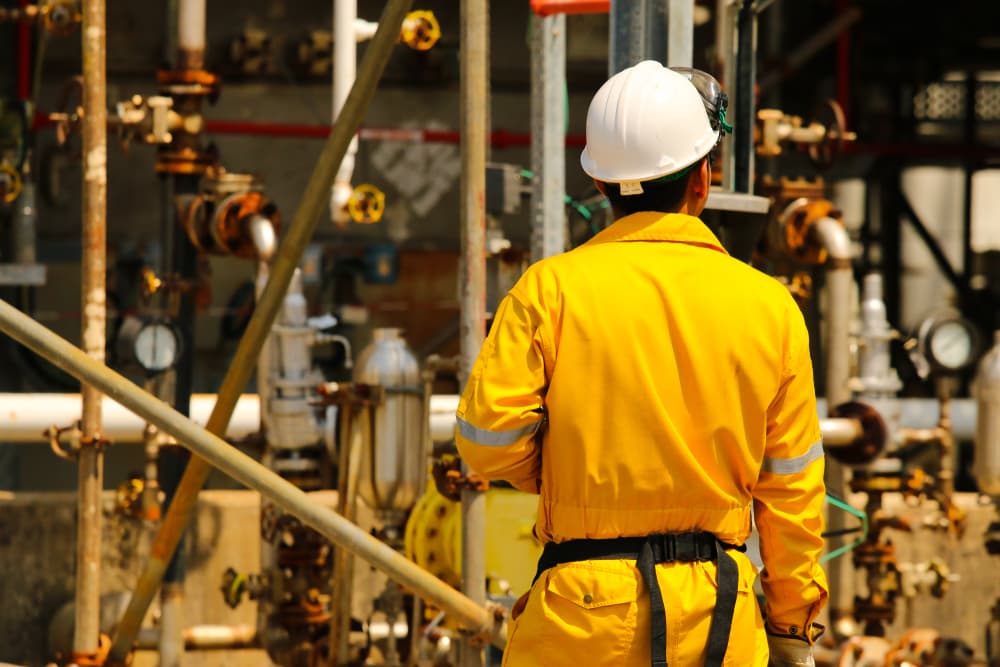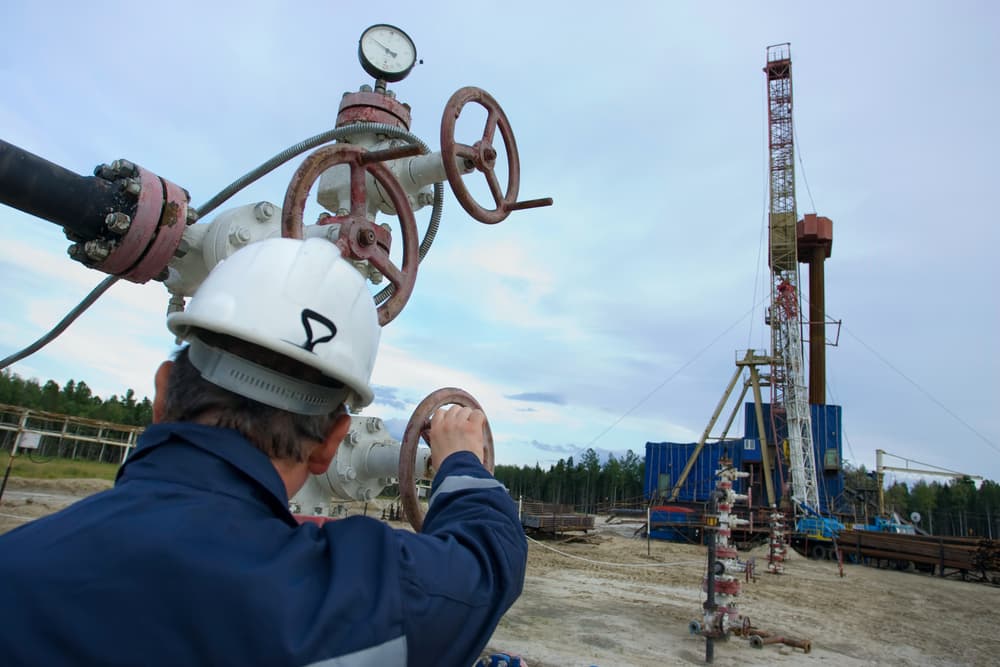Hazardous chemicals can lead to serious medical complications for individuals who work in oil fields. This is especially true when employers do not have the necessary safety protocols in place.
If you suffered an injury or illness due to hazardous chemical exposure while working in an oil field, you should seek experienced legal representation right away. A knowledgeable oil field injury attorney can discuss your circumstances with you and determine your eligibility for filing a workers’ compensation claim and/or a third-party claim. Your lawyer can then handle every step of the process for you and work to maximize the benefits and damages you recover.
How Can Exposure to Hazardous Chemicals Affect Oil Field Workers?
Exposure to hazardous chemicals in oil fields poses significant health risks to workers. Oil field workers routinely handle substances like benzene, hydrogen sulfide, and various drilling fluids, all of which can have severe short-term and long-term health consequences.

- Benzene is a common chemical in oil extraction and refining processes. It is a known carcinogen, meaning it can cause cancer, specifically leukemia. Short-term exposure to high levels of benzene can lead to symptoms such as dizziness, headaches, tremors, and even unconsciousness. Long-term exposure, even at lower levels, can cause bone marrow failure, leading to conditions like anemia and decreased immune function.
- Hydrogen sulfide, another hazardous chemical found in oil fields, is highly toxic and can be deadly. This gas has a characteristic rotten egg smell at low concentrations, but it can quickly deaden the sense of smell, making it harder to detect at dangerous levels. Short-term exposure to high concentrations can lead to respiratory paralysis, loss of consciousness, and death. Even low-level exposure over time can cause chronic headaches, poor memory, dizziness, and eye irritation.
- Drilling fluids used in the process of drilling oil wells often contain a mixture of chemicals that can be harmful. These fluids may cause skin irritation and respiratory problems when workers are exposed without adequate protective measures. Some of the chemicals in these fluids are also suspected to be endocrine disruptors, which can interfere with hormone functions and lead to reproductive health issues and other systemic health problems.
- Chronic exposure to these chemicals can lead to serious long-term health issues. Respiratory problems, including chronic bronchitis and other forms of chronic obstructive pulmonary disease (COPD), are common among oil field workers. Additionally, prolonged exposure to hazardous chemicals can result in neurological problems, including cognitive decline and mood disorders.
If you suffered any of these short-term or long-term health complications due to chemical exposure in an oil field, an experienced attorney can review your circumstances and determine your eligibility for filing a workers’ compensation claim.
What Safety Measures Can Employers Put in Place to Lessen Oil Field Workers’ Exposure to Hazardous Chemicals?
Employers in the oil industry have a critical responsibility to protect their workers from hazardous chemical exposure. Implementing various safety measures can significantly reduce the risks associated with working in these environments.
- One of the most effective safety measures is the use of personal protective equipment (PPE). Workers should be provided with high-quality gloves, masks, protective clothing, and safety goggles. These items help to shield the skin and respiratory systems from harmful chemicals. It’s also essential that the PPE is regularly inspected and replaced when worn out to maintain its effectiveness.
- Another vital measure is proper training and education. Workers need thorough training on how to handle hazardous chemicals safely. This includes understanding the potential risks, recognizing symptoms of exposure, and knowing how to use PPE correctly. Regular refresher courses should be conducted to keep safety practices current and effective.
- Employers should also implement engineering controls. This involves designing and maintaining equipment and facilities to minimize exposure. For example, installing proper ventilation systems can reduce the concentration of hazardous gases in the air. Similarly, using closed systems for transferring chemicals can prevent leaks and spills.
- Administrative controls are equally important. These can include developing and enforcing strict safety policies and procedures. Workers should follow specific protocols for handling, storing, and disposing of hazardous chemicals. Employers should also schedule regular safety drills and inspections to ensure compliance with safety standards.
- Monitoring and health surveillance also play a crucial role in protecting workers. Regular air quality monitoring can detect the presence of hazardous substances, allowing for immediate action if levels become dangerous. Additionally, routine health check-ups can help detect early signs of chemical exposure, enabling prompt medical intervention.
- Emergency response plans are also essential. Employers must have clear, well-communicated plans for dealing with chemical spills, leaks, or other exposure incidents. This includes having emergency equipment, like eyewash stations and showers, readily available and ensuring workers know how to use them.
- Lastly, fostering a safety culture within the workplace can make a significant difference. Encouraging workers to report safety hazards and near-miss incidents without fear of repercussions helps identify potential risks before they result in harm. Regular safety meetings and open communication about safety issues can also reinforce the importance of safety measures.
When other workers and employers violate these safety guidelines while working on an oil field, serious medical complications can arise.
Filing a Workers’ Comp Claim after Exposure to Hazardous Chemicals on an Oil Field
Filing a workers’ compensation claim after exposure to hazardous chemicals in an oil field is a crucial step to ensure that affected workers receive the medical care and support they need. Here’s a step-by-step guide on how to navigate the process.
- First, immediate and ongoing medical care is essential. If you’ve been exposed to hazardous chemicals on a job site, seek medical help and follow through with all treatment recommendations. Prompt medical evaluation not only safeguards your health but also provides documentation that is vital for your workers’ comp claim.
- Next, report the exposure to your employer as soon as possible. Most companies have specific procedures for reporting workplace injuries or exposures. Make sure to follow these procedures exactly. Typically, this involves notifying your supervisor and filling out an incident report. Timely reporting is critical because delays can complicate your claim or even result in a denial.
- After reporting the exposure, your employer should provide you with the necessary forms to file a workers’ compensation claim. Fill out these forms accurately and thoroughly. Include details about the incident, such as the type of chemical, how the exposure occurred, and the symptoms you’re experiencing. Providing as much detail as possible helps to substantiate your claim.
- Gather supporting documentation. This includes medical records, incident reports, and witness statements. Medical records are especially important because they provide evidence of your condition and the treatments you’ve received. If co-workers witnessed the exposure or can attest to the working conditions, their statements can also strengthen your claim.
- Submit your claim to the appropriate workers’ compensation board or agency in your state. Each state has its own procedures and deadlines for filing claims, so it’s important to understand and follow your state’s specific requirements. Missing a deadline can jeopardize your claim.
- Once your claim is submitted, your employer and the insurance company will review it. They may request additional information or documentation. Cooperate fully and promptly provide any requested information to avoid delays in the processing of your claim.
- Throughout this process, consider consulting an experienced oil field injury attorney. A lawyer can provide guidance, help ensure your rights are protected, and assist in navigating the legal aspects of your claim.
Recoverable Workers’ Comp Benefits Following Hazardous Chemical Exposure on an Oil Field
When oil field workers are exposed to hazardous chemicals, they may be entitled to workers’ compensation benefits to help them recover and manage the effects on their health and livelihood. These benefits are designed to provide financial support and medical care to workers injured or made ill due to workplace exposures.

- One of the primary benefits is medical coverage. Workers’ compensation typically covers all necessary medical expenses related to chemical exposure. This includes doctor’s visits, hospital stays, surgeries, medications, and ongoing treatments, like physical therapy or rehabilitation. It also covers the cost of any specialized equipment or services required for recovery, ensuring that workers receive comprehensive care without the burden of out-of-pocket expenses.
- In addition to medical benefits, workers may receive temporary disability benefits. If the chemical exposure results in an illness or injury that prevents the worker from performing their job, they may be eligible for temporary disability payments. These payments provide a portion of the worker’s lost wages during the period they are unable to work, helping to alleviate financial stress while they recover.
- For workers who suffer long-term or permanent effects from chemical exposure, permanent disability benefits may be available. These benefits compensate workers for the lasting effect on their ability to work and earn a living. The amount and duration of permanent disability benefits vary depending on the severity of the disability and the worker’s pre-injury earnings.
- Vocational rehabilitation benefits are also available to help workers who can no longer perform their previous job duties because of the effects of chemical exposure. These benefits provide training and support to help workers develop new skills and find alternative employment. This may include job counseling, vocational training programs, or assistance with job placement, enabling workers to re-enter the workforce in a different capacity.
- Lastly, in cases where chemical exposure leads to a worker’s death, death benefits are provided to the worker’s dependents. These benefits help cover funeral expenses and provide financial support to the worker’s family, compensating for the loss of income and ensuring their economic stability during a difficult time.
Pursuing a Third-party Claim or Lawsuit Following Exposure to Hazardous Chemicals on an Oil Field
Proving the elements of a third-party claim or lawsuit (after exposure to hazardous chemicals on an oil field) requires demonstrating that another party – besides your employer – is responsible for your injuries. Here’s a guide to understanding these elements and the types of compensation you can recover.

- First, you must establish that the third party owed you a legal duty of care. This means showing that the third party had a legal responsibility to ensure your safety. For instance, if a chemical manufacturer supplied defective or improperly labeled products, they had a duty to provide safe materials and accurate warnings.
- Second, you need to prove that the third party breached this duty of care. This involves demonstrating that the third party failed to meet the expected standard of care. For example, if the chemical manufacturer provided chemicals that were not properly tested or failed to include necessary safety instructions, they likely breached their legal duty.
- Third, you must show that this breach directly caused your injury. It’s not enough to show that the third party was negligent; you must link their negligence directly to your exposure and subsequent health issues. This can be done through medical records, expert testimony, and evidence showing how the breach led to your condition.
- Finally, you need to demonstrate that you suffered actual damages as a result of the chemical exposure. This includes medical expenses, lost wages, and pain and suffering. Documentation like medical bills, pay stubs, and personal testimony about your suffering can help to establish the extent of your damages.
After successfully proving these elements, you can seek various types of recoverable compensation.
- Medical expenses are typically covered, including current and future medical costs related to the exposure. This ensures that you can afford the necessary treatments, therapies, and medications.
- Lost wages are another form of compensation. If the exposure caused you to miss work, you can recover the income you lost during that period. Additionally, if your ability to work in the future is affected, you may be entitled to compensation for future lost earnings.
- Pain and suffering are also compensable. This covers the physical pain and emotional distress resulting from your chemical exposure and acknowledges the non-economic effect of your injury.
Speak with an Experienced Oil Field Injury Lawyer Today
If you sustained medical complications as a result of exposure to hazardous chemicals in an oil field, you have legal options available. A knowledgeable personal injury lawyer can promptly review your accident and injury circumstances and pursue a claim seeking the compensation you deserve.
